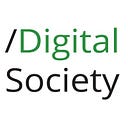Podcast transcript: The Internet
This podcast is part of the UCIL Digital Society course from the University of Manchester running in 2023/24 semester 2. The story it relates to is hosted on Medium and can be found here.
In this podcast Carlene Barton introduces the topic — The Internet.
TRANSCRIPT
Student Team:
Welcome to the Digital Society podcast. This week’s topic is the Internet.
Hello, I’m Jakub from the Library Student Team, and today on the Digital Society podcast, we are joined by Carlene to talk about the Internet.
Carlene is a Learning Technologist who designs and creates online learning content across all the Library Teaching programmes.
Carlene:
First of all, I want to talk about why I find the digital society interesting, and then I will give a bit more information on the topic of the internet which you will exploring this week.
Our society as a digital entity is something I am really interested in. With each digital innovation and new technology, we create opportunities to make our lives easier and more convenient; opportunities to learn and communicate and understand the world as a whole.
However, as we integrate digital into our lives, we also begin to rely on access to the internet to live comfortably. A lack of access can then pose a massive barrier for those less able to participate digitally whether that’s through learning or access. And with innovation there’s also an opportunity for those who wish to use technology for more nefarious purposes.
Anticipating these risks and dangers can be hard and often innovation is moving too fast for us to fully consider the ethical and practical applications and also the risks new technologies pose.
This unit is a chance to explore and reflect on your understanding of the digital society you’re a part of and how it is developing. What are your values and beliefs around digital society and what opportunities are there for you to learn, develop and contribute to its development?
This week our topic looks specifically at the internet. The internet is the core technology that has enabled most technological innovations in the last several decades. Without it many technologies simply wouldn’t exist. But how much do you understand about where it came from, what it is and the dangers and risks it poses?
The Internet connects people as individuals, groups, government, organisations, and charities. The Internet has become sort of one glue of society, and we use it every day for everything: studying, shopping, ordering food, communicating, banking and so on. So how would we function as a society without it? What would life look like if the internet was suddenly removed for longer than just a few days?
I attended high school from 1997 to 2004 . During this time there were some huge changes, a couple of people I knew got internet at home through dial-up, I saw the introduction of phones with WAP which was the first time the internet could be accessed from your mobile. It was also the time that media messaging on phones was introduced, and social media and instant messengers started to be used by those with internet access. However, I should highlight people having access at home wasn’t commonplace and neither were mobile phones as prevalent. Usually, people accessed the internet from home or work to find out information or communicate but not to shop, pay bills.
In this topic we are going to look at the way the Internet has developed and get a better understanding of how the Internet impacts and develops the digital society itself. We will explore the dangers of the internet and the increasing digital divide in our society where more and more people do not have knowledge or access to the internet and the problems they face.
Student Team: Now that you’ve heard a little bit about this topic, you’re ready to work through the Topic post which includes activities to help you join in the discussion. Engaging with all this content will help you prepare for the assessments. We look forward to hearing what you’ve got to say!
